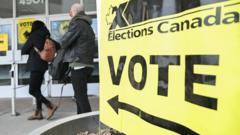As millions of Canadians cast their votes today, the stakes couldn't be higher in this consequential election that will determine the next leader of the nation amid increasing tensions with the U.S., particularly in light of President Trump’s aggressive trade tactics. A recent poll indicates that the Liberal Party, under Prime Minister Mark Carney, is leading slightly over the Conservatives led by Pierre Poilievre, reversing what seemed to be a favorable race for the latter just months prior.
Canada Faces Crucial Election Amidst Trump's Trade Wars and Political Shifts

Canada Faces Crucial Election Amidst Trump's Trade Wars and Political Shifts
Canadians head to the polls on April 28, 2025, in a pivotal election that could reshape the political landscape and response to external pressures.
With three months of electioneering behind them, the campaign landscape has shifted dramatically. Just a few months ago, the Conservatives appeared to be on a path to victory, benefiting greatly from a burgeoning discontent with the outgoing Liberal leadership under Justin Trudeau. Trudeau’s resignation precipitated a drastic turnaround for the Liberals, who have capitalized on growing public sentiment that favors a more diplomatic stance against Trump’s tariffs and threats toward Canadian sovereignty.
The upcoming voting process also sees smaller parties, including the New Democratic Party and the Bloc Quebecois, looking to secure their places in Parliament, although it is clear that the battle lies primarily between Carney and Poilievre. Polls have reported a sizable number of participants engaging in early voting, with over 7.2 million Canadians casting their ballots beforehand, underscoring the urgency and significance of the election.
The incumbent, Mark Carney, a former financial sector executive with a significant background in banking, has emerged as a beacon of stability portraying himself as the candidate capable of navigating the turbulent trade relations with the United States. His approach has focused heavily on economic resilience amidst trade upheavals.
Contrasting Carney is Pierre Poilievre, who, despite a prior favorable standing in the polls, has struggled to distance himself from Trump’s populism, which has dominated headlines. Observers note that his style and rhetoric may alienate moderate voters during a period where Trump’s growing unpopularity among the Canadian electorate is paramount.
As polling sites closed today, Canadians expressed their hopes for a government that can stand firm against Trump's foreign policy while managing domestic challenges like rising living costs and inflation. The results, expected late Monday night, will reveal not just who will lead the country, but also which direction Canada will take amidst a complicated global landscape.
With a carefully constructed electoral system that favors plurality over majority, the election outcome may not only reflect voter sentiment but could also reshape the power dynamics within the Canadian Parliament itself.
As the nation waits to tally the votes and witness the outcome of this critical election, Canadians are left pondering the true cost of international relations and the importance of maintaining sovereignty in a connected world.
The upcoming voting process also sees smaller parties, including the New Democratic Party and the Bloc Quebecois, looking to secure their places in Parliament, although it is clear that the battle lies primarily between Carney and Poilievre. Polls have reported a sizable number of participants engaging in early voting, with over 7.2 million Canadians casting their ballots beforehand, underscoring the urgency and significance of the election.
The incumbent, Mark Carney, a former financial sector executive with a significant background in banking, has emerged as a beacon of stability portraying himself as the candidate capable of navigating the turbulent trade relations with the United States. His approach has focused heavily on economic resilience amidst trade upheavals.
Contrasting Carney is Pierre Poilievre, who, despite a prior favorable standing in the polls, has struggled to distance himself from Trump’s populism, which has dominated headlines. Observers note that his style and rhetoric may alienate moderate voters during a period where Trump’s growing unpopularity among the Canadian electorate is paramount.
As polling sites closed today, Canadians expressed their hopes for a government that can stand firm against Trump's foreign policy while managing domestic challenges like rising living costs and inflation. The results, expected late Monday night, will reveal not just who will lead the country, but also which direction Canada will take amidst a complicated global landscape.
With a carefully constructed electoral system that favors plurality over majority, the election outcome may not only reflect voter sentiment but could also reshape the power dynamics within the Canadian Parliament itself.
As the nation waits to tally the votes and witness the outcome of this critical election, Canadians are left pondering the true cost of international relations and the importance of maintaining sovereignty in a connected world.





















